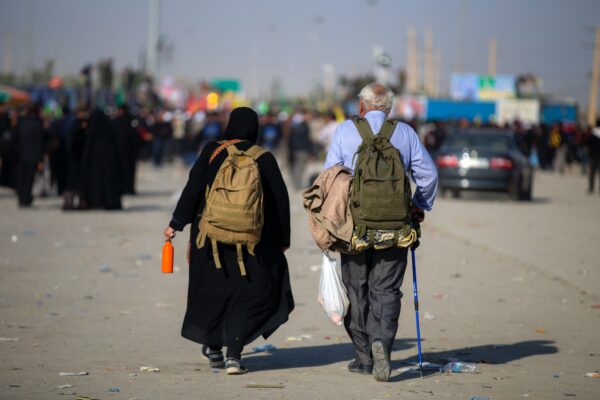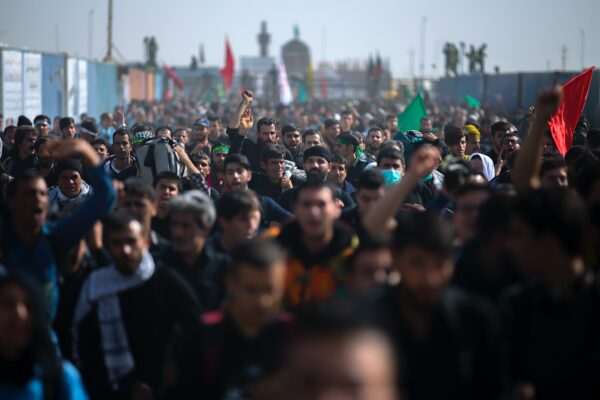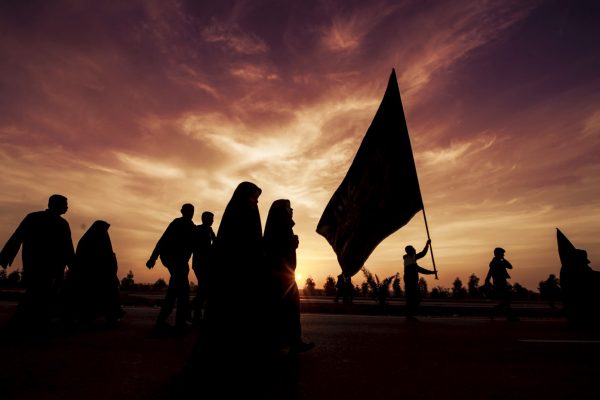Imam Hussain refused to stay silent: his repudiation of the crimes of the Umayyad dynasty is an inspiration to all those fighting for the dignity of life.
Imam Hussain refused to stay silent: his repudiation of the crimes of the Umayyad dynasty is an inspiration to all those fighting for the dignity of life.
A cry less than fifty years since the Prophet’s passing (peace be upon him and his progeny) witnessed his only male grandson alive brutally massacred alongside his family and supporters. The perpetrators of this heinous crime were not the Romans or, as some may call, “the Kuffar”, but the ruling elite of the newly founded Muslim empire.
Yes, a so-called Muslim would dare to commit a crime which the renowned Muslim theologian Abū al-Ḥasan al-Ashʿarī (d. 324AH) described as the greatest catastrophe perpetrated in human history. The question that emerges is how any human could treat his fellow brother in such an unethical manner.
Was it not the dear Prophet (peace be upon him and his progeny) who decades earlier declared in the authentic narration, “Verily, your lives, your property, and your reputations have been made sacred to you”? The cries of Karbala even awakened with sympathy the coldest of readers, alludes Edward Gibbon.
With the current dilemmas that humans face, from wars, poverty, plagues and corruptions, the question that emerges is: ‘How can a Muslim contextualise the relevance of Imam Hussain in a modern era?’ For those who assert to be civilised by legitimising dictatorship and narrowmindedness, their whole survival relies on the disunity of others. The greatest threat, in my opinion, is not that the devil exists but how he has convinced the great Muslim Ummah into blindly accepting its unfortunate reality.
When we contextualise with a holistic approach, the life and lessons learned from Imam Hussain, what becomes clear was his sheer resoluteness against oppression. There was no compromise, hence why he was more than willing to sacrifice his life to preserve justice. Imam Hussain and his followers were rigid believers, asserts Thomas Carlyle, who demonstrated that numerical superiority has no resolve to truth and falsehood.
Human beings are the most superior of all creation, and with all their sophistication are still incapable of pure obedience to The Creator. This resonates from the story of the creation of Adam and Shaytan, which Imam Hussain’s great-grandson, Jaʿfar ibn Muḥammad aṣ-Ṣādiq (d.148AH) asserted that Allah knew the nature of His creation, its deficiencies and hence sent them a person from amongst themselves, who embodied Himself, with the pure obedience to The Creator.
When humans challenge the natural disposition that Allah placed in humankind, what emerges is the ugly face of humans. We claim to be civilised in the modern world, with all the technology and advancement that humans have achieved, yet are still so barbaric, so unfair, and unethical to nature. The Malaysian human rights activist, Matthias Chang, shouts that the 20th century alone was the bloodiest and claimed more lives than any other era of time.
When considering the plight of Yazidi victims to those suffering at the hands of oppressors in the Holy Land, Imam Hussain’s sacrifice teaches us is that with patience and perseverance, the evildoer will ultimately be been rid of his ability to harm others, and what remains is the resolve of the righteous to stand tall during such tribulations. We can take inspiration from Imam Hussain’s unselfishness and sheer dedication.
In my opinion, this perseverance from Imam Hussain’s sacrifice in Karbala brings forth a few vital lessons in the fight against injustice. Firstly, never remain silent during oppression. When Muawiyah nominated his son as his successor, Imam Hussain’s resolve was to speak up against such policies, which were not only un-Islamic but also unethical. Prejudices, injustices, and oppression were challenged within an environment which required change.
Imam Hussain refused to stay silent: his repudiation of the crimes of the Umayyad dynasty is an inspiration to all those fighting for the dignity of life. Speaking up against injustice empowers others to follow suit, and through dedication change can occur. The perpetrators of oppression, injustice, and prejudice can ultimately be defeated with endurance and perseverance.
Secondly, injustices and a call to action to challenge them should be should be communicated far and wide. The victims’ sentiments, sorrows, and stories should also be amplified so their plight becomes mainstream knowledge. Think of Nelson Mandela’s fight against apartheid: not only did his unyielding determination lead him to refuse to be intimidated, but he also amplified his cause throughout the world in the best of ways. He eloquently and academically deconstructed the arguments put forth by his oppressors to demonstrate their weaknesses, and their deluded reasoning and rationale.
The end means can never justify the methodology, hence why the approach employed by the victims must not only be sane but susceptible to the human consciousness. It is this human consciousness when awakened that can change the sentiments and opinions of society. We can change public opinion for just causes.
At the Centre for Intra-Muslim Studies (CIMS) in Birmingham, we aim to provide a platform to explore historical and theological differences that have plagued Muslims for over fourteen centuries. We must be bold enough to sit with those we may disagree with, and engage in critical debate to discuss our many different opinions in an academic setting within the boundaries of collegiality.
May Allah grant us a world with peace, love, and unity under His Mercy, Aamin.





